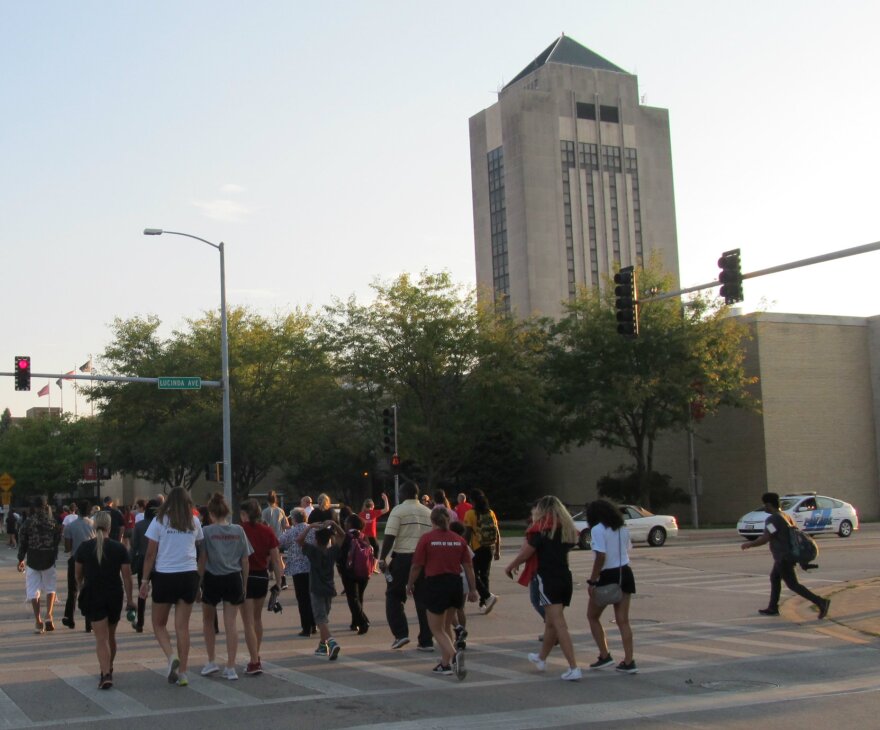Northern Illinois University recently held the 5th annual Unity Walk in DeKalb. On this week's Friday Forum, WNIJ's Jenna Dooley talks with participants about what it means to take part in the event.
The Unity Walk began five years ago following protests in Missouri over the death of Michael Brown, a resident of Ferguson. Brown was killed by a police officer, resulting in national news and tense relations between the community and law enforcement.
NIU leaders felt a walk in northern Illinois could bring together different groups of people who make up the campus community. This walk includes police officers, community members, faith leaders and student leaders. The walk this year was followed by a discussion on implicit bias.
Darryl Howard is the Vice President of Operations for the Campus Activities Board.
He defines implicit bias as "having your own opinion based off stereotypes or anything that you have heard based on a different group of people."

He thinks more progress is needed to reduce instances of implicit bias in the classroom, residence halls, and elsewhere on campus.
"So take all those different avenues and just be more vocal that we're trying to expand unity," he said. "Because it's like if you don't know about it, you're not really going to pay that much attention to it because there are a lot of people out here in their own world. They're not really cognizant of what's going on."
He says it's not just up to the university to facilitate inclusiveness; he encourages students to be part of the solution.
"I'm the type of person who can talk to everybody," Howard said. "It doesn't really matter to me. I know I can tie different groups of people in with each other."
He says the walk is a way to display a desire for onlookers to improve inclusiveness at NIU and the community.
"They see people who may look like them, and then they see people who don't look like them," Howard explained. "Maybe the next time they see something going on like this, they'll maybe want to get involved. So basically more awareness is going to spread."
But confronting implicit bias can be uncomfortable for some. Howard has some advice.
"Basically, just be respectful of yourself and respectful of the people around you and take your 'cool' hat off because we are all the same," he said. "We're all here for the same reason and we're all trying to accomplish the same goal."
Maggie Hitchcock is the Treasurer for NIU's LGBTQA organization Prism.
"We find it very important to show up for things that promote campus unity because we want to show that we are here to participate and collaborate whenever possible about things that involve inclusivity, diversity, and just promoting general wellbeing here on campus," Hitchcock said.
When it comes to the uncomfortable conversations which may spring out of implicit bias, Hitchcock says there are resources at the palm of one's hand.
"Google's your friend," Hitchcock said. "Anybody can go searching and learn more and try to come prepared to those conversations."

Her definition of implicit bias comes out of a variety of identities and privileges.
"Sometimes based on our own experiences, we can carry implicit bias -- or just privilege -- and fail to acknowledge the way that certain situations and certain access is denied for certain populations and marginalized groups," Hitchcock said. "Implicit bias can just be the way it can exist in our minds and we don't know it's there. So we have got to get through that and listen to other people."
She says if a person feels safe to do so, they should call out implicit bias when they see it or experience it.
"Activism looks a lot of different ways," Hitchcock said. "If you feel comfortable and safe to have conversations with people, it's a great way to teach. But safety has always got to be the priority for a person, because, you know, their rights can be infringed and we want people to be safe."
She says she appreciates that the campus community is willing to foster inclusivity with different resources like the Unity Walk.
"I think they always try and I just hope they always continue to try," Hitchcock said.


